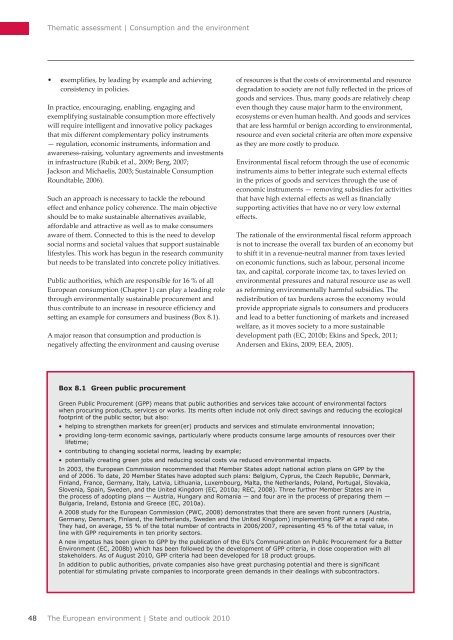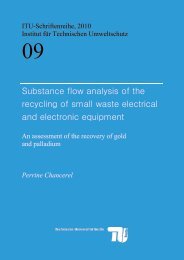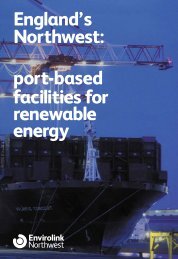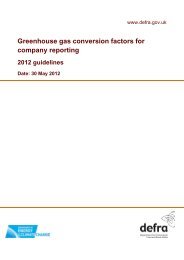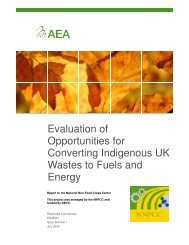Consumption and the environment (SOER2010) - European ...
Consumption and the environment (SOER2010) - European ...
Consumption and the environment (SOER2010) - European ...
You also want an ePaper? Increase the reach of your titles
YUMPU automatically turns print PDFs into web optimized ePapers that Google loves.
Thematic assessment | <strong>Consumption</strong> <strong>and</strong> <strong>the</strong> <strong>environment</strong><br />
• exemplifies, by leading by example <strong>and</strong> achieving<br />
consistency in policies.<br />
In practice, encouraging, enabling, engaging <strong>and</strong><br />
exemplifying sustainable consumption more effectively<br />
will require intelligent <strong>and</strong> innovative policy packages<br />
that mix different complementary policy instruments<br />
— regulation, economic instruments, information <strong>and</strong><br />
awareness‐raising, voluntary agreements <strong>and</strong> investments<br />
in infrastructure (Rubik et al., 2009; Berg, 2007;<br />
Jackson <strong>and</strong> Michaelis, 2003; Sustainable <strong>Consumption</strong><br />
Roundtable, 2006).<br />
Such an approach is necessary to tackle <strong>the</strong> rebound<br />
effect <strong>and</strong> enhance policy coherence. The main objective<br />
should be to make sustainable alternatives available,<br />
affordable <strong>and</strong> attractive as well as to make consumers<br />
aware of <strong>the</strong>m. Connected to this is <strong>the</strong> need to develop<br />
social norms <strong>and</strong> societal values that support sustainable<br />
lifestyles. This work has begun in <strong>the</strong> research community<br />
but needs to be translated into concrete policy initiatives.<br />
Public authorities, which are responsible for 16 % of all<br />
<strong>European</strong> consumption (Chapter 1) can play a leading role<br />
through <strong>environment</strong>ally sustainable procurement <strong>and</strong><br />
thus contribute to an increase in resource efficiency <strong>and</strong><br />
setting an example for consumers <strong>and</strong> business (Box 8.1).<br />
A major reason that consumption <strong>and</strong> production is<br />
negatively affecting <strong>the</strong> <strong>environment</strong> <strong>and</strong> causing overuse<br />
of resources is that <strong>the</strong> costs of <strong>environment</strong>al <strong>and</strong> resource<br />
degradation to society are not fully reflected in <strong>the</strong> prices of<br />
goods <strong>and</strong> services. Thus, many goods are relatively cheap<br />
even though <strong>the</strong>y cause major harm to <strong>the</strong> <strong>environment</strong>,<br />
ecosystems or even human health. And goods <strong>and</strong> services<br />
that are less harmful or benign according to <strong>environment</strong>al,<br />
resource <strong>and</strong> even societal criteria are often more expensive<br />
as <strong>the</strong>y are more costly to produce.<br />
Environmental fiscal reform through <strong>the</strong> use of economic<br />
instruments aims to better integrate such external effects<br />
in <strong>the</strong> prices of goods <strong>and</strong> services through <strong>the</strong> use of<br />
economic instruments — removing subsidies for activities<br />
that have high external effects as well as financially<br />
supporting activities that have no or very low external<br />
effects.<br />
The rationale of <strong>the</strong> <strong>environment</strong>al fiscal reform approach<br />
is not to increase <strong>the</strong> overall tax burden of an economy but<br />
to shift it in a revenue‐neutral manner from taxes levied<br />
on economic functions, such as labour, personal income<br />
tax, <strong>and</strong> capital, corporate income tax, to taxes levied on<br />
<strong>environment</strong>al pressures <strong>and</strong> natural resource use as well<br />
as reforming <strong>environment</strong>ally harmful subsidies. The<br />
redistribution of tax burdens across <strong>the</strong> economy would<br />
provide appropriate signals to consumers <strong>and</strong> producers<br />
<strong>and</strong> lead to a better functioning of markets <strong>and</strong> increased<br />
welfare, as it moves society to a more sustainable<br />
development path (EC, 2010b; Ekins <strong>and</strong> Speck, 2011;<br />
Andersen <strong>and</strong> Ekins, 2009; EEA, 2005).<br />
Box 8.1 Green public procurement<br />
Green Public Procurement (GPP) means that public authorities <strong>and</strong> services take account of <strong>environment</strong>al factors<br />
when procuring products, services or works. Its merits often include not only direct savings <strong>and</strong> reducing <strong>the</strong> ecological<br />
footprint of <strong>the</strong> public sector, but also:<br />
• helping to streng<strong>the</strong>n markets for green(er) products <strong>and</strong> services <strong>and</strong> stimulate <strong>environment</strong>al innovation;<br />
• providing long‐term economic savings, particularly where products consume large amounts of resources over <strong>the</strong>ir<br />
lifetime;<br />
• contributing to changing societal norms, leading by example;<br />
• potentially creating green jobs <strong>and</strong> reducing social costs via reduced <strong>environment</strong>al impacts.<br />
In 2003, <strong>the</strong> <strong>European</strong> Commission recommended that Member States adopt national action plans on GPP by <strong>the</strong><br />
end of 2006. To date, 20 Member States have adopted such plans: Belgium, Cyprus, <strong>the</strong> Czech Republic, Denmark,<br />
Finl<strong>and</strong>, France, Germany, Italy, Latvia, Lithuania, Luxembourg, Malta, <strong>the</strong> Ne<strong>the</strong>rl<strong>and</strong>s, Pol<strong>and</strong>, Portugal, Slovakia,<br />
Slovenia, Spain, Sweden, <strong>and</strong> <strong>the</strong> United Kingdom (EC, 2010a; REC, 2008). Three fur<strong>the</strong>r Member States are in<br />
<strong>the</strong> process of adopting plans — Austria, Hungary <strong>and</strong> Romania — <strong>and</strong> four are in <strong>the</strong> process of preparing <strong>the</strong>m —<br />
Bulgaria, Irel<strong>and</strong>, Estonia <strong>and</strong> Greece (EC, 2010a).<br />
A 2008 study for <strong>the</strong> <strong>European</strong> Commission (PWC, 2008) demonstrates that <strong>the</strong>re are seven front runners (Austria,<br />
Germany, Denmark, Finl<strong>and</strong>, <strong>the</strong> Ne<strong>the</strong>rl<strong>and</strong>s, Sweden <strong>and</strong> <strong>the</strong> United Kingdom) implementing GPP at a rapid rate.<br />
They had, on average, 55 % of <strong>the</strong> total number of contracts in 2006/2007, representing 45 % of <strong>the</strong> total value, in<br />
line with GPP requirements in ten priority sectors.<br />
A new impetus has been given to GPP by <strong>the</strong> publication of <strong>the</strong> EU's Communication on Public Procurement for a Better<br />
Environment (EC, 2008b) which has been followed by <strong>the</strong> development of GPP criteria, in close cooperation with all<br />
stakeholders. As of August 2010, GPP criteria had been developed for 18 product groups.<br />
In addition to public authorities, private companies also have great purchasing potential <strong>and</strong> <strong>the</strong>re is significant<br />
potential for stimulating private companies to incorporate green dem<strong>and</strong>s in <strong>the</strong>ir dealings with subcontractors.<br />
48<br />
The <strong>European</strong> <strong>environment</strong> | State <strong>and</strong> outlook 2010


